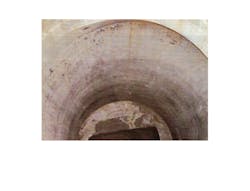For precast manhole producers in Louisiana, corrosion prevention is a major consideration. In today’s depressed economy, cities are forced to stretch their budgets and select the most cost-effective products. This means selecting products with the longest performance for the least cost! The concrete industry is forced more and more frequently to compete with alternative products such as plastic and fiberglass and these producers emphasize the susceptibility to corrosion of unprotected concrete in sanitary sewer environments. In fact, these producers commonly encourage wastewater design engineers to specify expensive coating and plastic linings for concrete pipe and manholes in order to force higher, non-competitive prices for concrete pipe and manholes. Such was the case in Louisiana until precast producers discovered the benefits of adding the ConmicShield® into their concrete mix at the plant allowing them to reduce costs, improve productivity and avoid field repairs.
Lafayette Utilities Systems (LUS), in Lafayette, Louisiana, was formed in 1895 and employs more than 500 people. It’s a department of the Lafayette Consolidated Government that manages electrical, water, wastewater, and telecommunications networks. This publicly owned and operated utility offers the lowest rates in the region. The wastewater system serves 41,000 retail customers and operates four treatment plants that process 18.5 million gallons daily. There are more than 560 miles of collection pipe in its system; and, because this part of Louisiana is relatively flat, its system has more than 150 lift stations and high levels of hydrogen sulfide gas making it an excellent environment for testing materials for corrosion protection.
Gravity sewer pipe on shallow grades, high ambient temperatures, and lots of lift stations create perfect conditions for rapid development of acid-producing bacteria. Turbulence (caused by lift stations), combined with organic waste, warm temperatures, slow moving water, and low oxygen levels, leads to high concentrations of hydrogen sulfide gas. The gas feeds colonies of Thiobacillus bacteria, which excrete sulfuric acid–some strains of Thiobacillus can thrive in acid concentrations as high as 7-percent. The resulting sulfuric acid attacks concrete directly, turning it into crumbly calcium sulfate (gypsum). Once the bacteria colonize, the process of microbiologically induced corrosion (MIC) works from the inside out to quickly compromise concrete integrity. In southern Louisiana, unprotected concrete can corrode at the rate of 1” in three years.
Consequently, many manholes are subject to failure and in need of constant maintenance. The Lafayette Utilities System is always on the lookout for new ways to prevent MIC and has tested dozens of epoxies, linings, and other technologies. In October 2001, it used the Permacast system by AP/M Permaform to apply Permacast® high-strength, cementitious liner fortified with ConShield to a manhole that is historically prone to severe corrosion. ConShield is a concrete additive that permanently inhibits MIC. It is added directly to certain concrete mixtures, replacing some mix water in pre-determined ratios. It bonds molecularly with cement particles so it cannot leach out of the concrete; and, unlike coatings, it cannot peel, chip or delaminate. Even though ConShield is not toxic to humans or animals, the treated concrete is anti-microbial, and permanently prevents the growth of Thiobacillus for the concrete’s entire lifecycle. When used with the Permacast liner system, the result is a complete rehabilitation that is corrosion protected and structurally sound.
More than nine years later, in December of 2010, representatives from AP/M Permaform and Lafayette Utilities convened at the manhole to inspect and assess its condition. Left untreated, the utility would have expected a badly deteriorated manhole needing major repair or complete replacement.
Coatings and linings have not usually been effective against MIC–since Thiobacillus colonies only need tiny holes to penetrate coatings and linings; and, they can easily establish themselves, unseen, behind the coating. When this happens, the coatings slough off and the underlying concrete is severely damaged. By contrast ConShield is integral to the concrete matrix throughout the entire thickness, not just on the surface. ConShield treated concrete prevents the acid producing Thiobacillus bacteria from colonizing.
Everyone attending the 2010 inspection was pleased to observe a perfectly sound manhole, with no concrete deterioration. These results are extremely positive and once again prove the benefit of ConShield for corrosion protection. Since it is easily dosed at the precast plant just like other liquid additives, there is no extra work or delays in production.
No outside coating contractors or field welding and testing are required. ConShield in concrete provides long term corrosion protection and it saves time and money for the producer and the utility. Precast concrete producers in Louisiana are seeing an increase in specifications naming ConShield treated concrete for sanitary sewer systems with high levels of hydrogen sulfide.
Editor's Note: Scranton Gillette Communications and the SGC Infrastructure Group are not liable for the accuracy, efficacy and validity of the claims made in this piece. The views expressed in this content do not reflect the position of the Roads & Bridges' Editorial Team.
